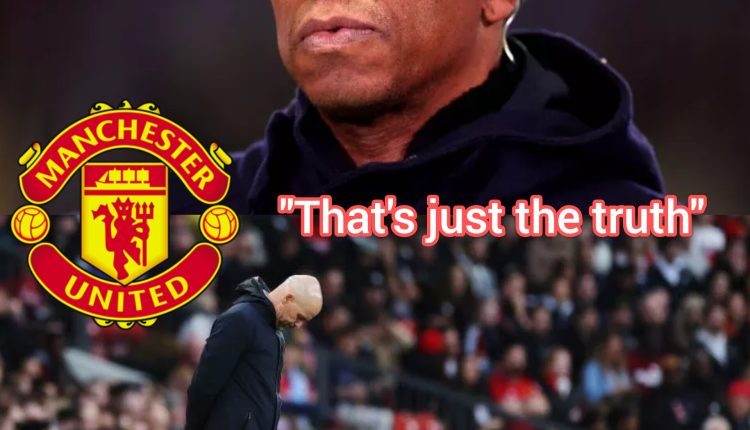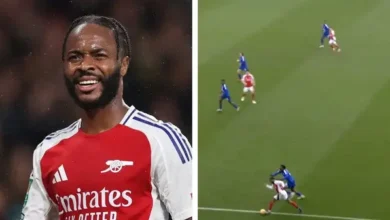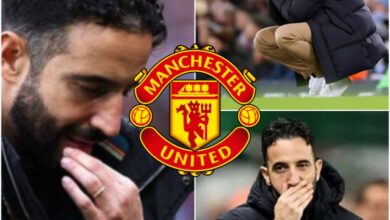That’s just the truth. There’s no chance they’ll get to go to the Champions League next season and that’s if they don’t get relegated with the way things are going. And it’s because of his lack of charisma that he is not in the same level as Guardiola ” – This is according to Ian Wright as he seriously criticizes Erik ten Hag for lacking one key element he’s never had at Manchester United.

One crucial aspect every manager needs is full commitment from their players, and Erik ten Hag seems to have never achieved that at Manchester United.
In contrast, managers like Mikel Arteta at Arsenal and Pep Guardiola at Manchester City have created strong team unity, and Jurgen Klopp had the same at Liverpool before his departure. Even Arne Slot is currently inspiring excellent performances from the Reds.
When you hear ten Hag speak in interviews, such as one shared by beIN Sports on X, he comes across as stiff and somewhat robotic, with his English not always clear in terms of conveying his ideas.
This raises concerns: if that’s how he appears to the public, is he delivering the same unclear messages to his players? It seems something isn’t connecting.
A growing belief that ten Hag may have lost control of the dressing room led Stan Collymore to make a remark that’s likely to aggravate Manchester United supporters.
Stan Collymore shared his blunt opinion in his exclusive column for *CaughtOffside*, stating, “I don’t think Erik ten Hag ever had control of the Manchester United dressing room, to be perfectly honest.”
He continued, “When you win a couple of cups, players might experience a ‘halo effect’ and think, ‘well, actually, maybe there’s more to this guy.’”
However, Collymore argued, “Man United haven’t played with any identity, belief, or authority since ten Hag’s arrival. That’s just the truth.”
Although the truth may be painful for Red Devils fans, Collymore didn’t shy away from reinforcing his stance.
“There’s absolutely no indication, beyond those cup wins, that Manchester United are feared or even respected on the pitch in regular league games anymore,” Collymore added.
He continued, “Players notice these things, and while they have their professional pride, I doubt there’s a single player truly playing for the manager. Not one.”
“They’re playing so poorly right now that there’s zero chance of Manchester United getting back into the Champions League spots this season, and that’s a truly dismal situation.”
Stan Collymore’s assessment of Erik ten Hag’s tenure at Manchester United reflects a growing concern among fans and analysts about the lack of cohesion and identity within the team. Since his arrival, Ten Hag has faced challenges in uniting the dressing room, and Collymore’s argument that the manager may never have had full control of the squad highlights the deeper issue.
Comparisons to managers like Pep Guardiola, Mikel Arteta, and even Jurgen Klopp at their peak emphasize the critical importance of not just tactical expertise but also emotional intelligence and communication skills in modern football management. These managers have successfully created environments of mutual trust and commitment, translating into strong team performances and a clear identity on the pitch.
Ten Hag’s perceived stiffness and unclear communication, as suggested in his interviews, might point to a disconnect between his ideas and their execution by the players. If the public sees this, it’s reasonable to ask if similar problems exist in the dressing room, where a manager’s ability to inspire and motivate is crucial.
Collymore’s view—that United’s players may not be fully committed to Ten Hag—resonates with the on-field evidence, where performances have often lacked the intensity, belief, or authority associated with top teams. His claim that the team is no longer feared or respected further adds to the bleak picture, suggesting that even past successes, like the domestic cup wins, have not created lasting confidence in the manager.
If true, this disconnect will make it incredibly difficult for Manchester United to regain their competitive edge in the Premier League and beyond. As Collymore suggests, without a strong bond between manager and players, Champions League qualification could be an unrealistic goal for this season.








